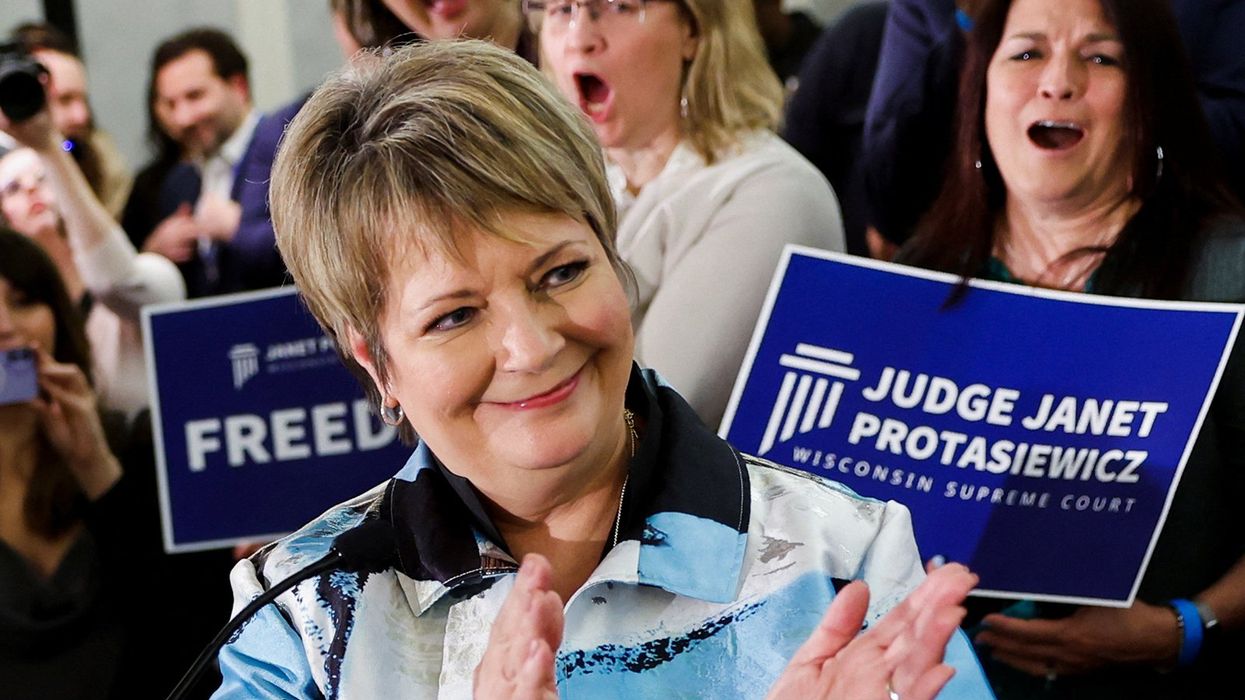(CNN) — The victory of a liberal judge in Tuesday's Wisconsin Supreme Court election marks a significant political realignment toward the left in a crucial swing state, potentially closing the door on an era of Republican dominance with issues such as abortion rights at stake.
With liberals now poised to effectively control the seven-judge court, Democrats are newly optimistic about saving abortion access in the state, establishing a firewall against any Republican challenges to the 2024 elections and potentially redoing GOP-drawn state legislative and congressional maps. That combination of issues proved a potent force in a race that attracted massive turnout and spending.
And as they did in last year's midterms in some places around the country, Democrats, once again, appear to have capitalized on a broad backlash to the US Supreme Court's overturning of Roe v. Wade and a base still energized by the specter of another Donald Trump presidency.
Republican-supported Daniel Kelly lost the technically nonpartisan contest to Democratic-backed Janet Protasiewicz, who will begin a 10-year term this summer, effectively flipping control of the divided bench to liberals. Conservative Justice Patience Roggensack's retirement opened the seat, triggering a contentious race that attracted national attention — and donor dollars. It was the most expensive state judicial election in the country ever.
"Anger about Roe hasn't dissipated. Fear for our democracy remains. Voters are still alarmed by the MAGA extremism of candidates like Dan Kelly. And if this race is an early bellwether — we can safely say that Republicans didn't learn their lesson in 2022," said Sarah Dohl, the chief campaigns officer for Indivisible, a progressive advocacy group.
Wisconsin has emerged as one of the country's most competitive political fronts, with ground that's expected to again be hotly contested in next year's presidential and Senate races. But the state government — outside the governor's office — has been bossed by Republicans. Since defeating GOP Gov. Scott Walker more than four years ago, Democratic Gov. Tony Evers has vetoed roughly 150 bills and been hamstrung in pursuing large parts of his own agenda. Now, GOP policy gains at the state level — most notably its crushing of public sector labor unions — are in doubt.
A Democratic resurgence?
In the years before Trump's emergence, the Wisconsin GOP ran roughshod over state politics and sought to export its national playbook around the country. Walker entered the 2016 GOP presidential primary as an early favorite, pitching his state as a model for the nation. But like so many others in that year's Republican field, he never got off the blocks as Trump thundered to the nomination.
That fall, Trump shattered the Democratic illusion of a "blue wall" in the Upper Midwest, defeating Hillary Clinton by fewer than 25,000 votes in the Wisconsin general election.
But Trump's victory also triggered a backlash — and a mini Democratic resurgence at the state level.
Evers was first elected governor during the 2018 Democratic wave. He won a second term last year. And though Republican Sen. Ron Johnson held his seat in 2022, Trump had lost the state two years earlier by a little more than 20,000 votes. His false allegations of 2020 election fraud infuriated Democrats, along with many swing voters, and ultimately in this year's Wisconsin Supreme Court race hobbled Kelly, who faced blowback for his role in advising GOP officials in their efforts to hatch a fake electors scheme
And while the court could find itself ruling on election laws again, abortion may the most immediate battle to reach the justices.
The state's high court is expected to decide a lawsuit challenging an 1849 law that bans nearly all abortions, which had been dormant for decades but snapped back into place with last year's US Supreme Court ruling. Protasiewicz, Wisconsin Democrats and allied groups such as Planned Parenthood, NARAL Pro-Choice America and Emily's List all worked to frame the race as another referendum on abortion rights.
"For over a decade, anti-choice ideologues have held their iron grip on Wisconsin's highest court, leaving voters hungry for change," NARAL president Mini Timmaraju said in a statement. "Judge Janet's resounding victory comes as abortion access faces an onslaught of attacks by extremist state courts determined to tear up our rights at every step."
Victory for abortion rights activists follows a similar result in neighboring Michigan, which voted last fall to enshrine abortion and other reproductive rights into the state constitution while reelecting Democratic women to its three most powerful executive offices. Those results continued a streak of successes for Democrats who dug in hard on the issue — a political winner in many swing states and legislative districts.
Kelly, the conservative in Wisconsin, was coy about how he would rule on a slate of potential hot-button cases, but his past writings and work for anti-abortion groups allowed Protasiewicz, who signaled her skepticism about the ban, to attack him on the issue. Her past comments also suggest a new day's dawning for the labor community and Democrats seeking to upend the state's skewed legislative maps.
"Everything from gerrymandering to drop boxes to Act 10 may be revisited to women's right to choose," Protasiewicz told Wisconsin Radio Network in February. (Act 10 eliminated collective bargaining for most public sector employees.)
And with another presidential election on the horizon, her willingness to consider attempts to roll back or reverse restrictive voting laws or regulations could have clear national implications.
The state's voter ID laws, put in place by Republicans, are among the strictest in the country. Wisconsin's high court played a pivotal role in the outcome of the 2020 election, rejecting a Trump lawsuit aimed at invalidating Joe Biden's victory — but only by a 4-3 margin with one conservative justice siding with the liberals.
In the event of another challenge like that, Democrats would now only need their allies to hold the line to prevent a similar bid.
The-CNN-Wire
™ & © 2023 Cable News Network, Inc., a Warner Bros. Discovery Company. All rights reserved.


















































